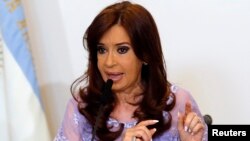All three of the leading candidates in Argentina's election race plan to dismantle outgoing President Cristina Fernandez's web of currency and trade controls and clean up government finances to boost the stagnating economy.
Fernandez has ramped up state intervention in the economy during her eight years in power, trying to shore up thinning currency reserves while financing generous subsidies and welfare programs.
The economy grew quickly in the first years of her presidency but it is now teetering on the brink of recession.
The currency has slumped on the black market and inflation is running at about 25 percent, according to private estimates.
Economic advisers to the main candidates in the October election told Reuters they plan to liberalize the dollar exchange rate, cut taxes on lucrative grains exports, and move to plug a fiscal deficit and tame inflation.
The consensus on the need for policy changes could further encourage investors who have driven a rally in Argentina's bond and equity markets this year and renewed interest from hedge funds in the country.
The campaign teams differ, however, on the pace and depth of reform.
Mauricio Macri, the pro-business opposition mayor of Buenos Aires who is running a close second place in polls, promises swift changes to win back investor confidence.
Daniel Scioli, the frontrunner for the leftist ruling party's ticket, is more cautious as he targets votes from the Fernandez faithful as well as swing voters opposed to her policies.
And third-placed Sergio Massa, who broke ranks with the president two years ago, pitches himself in the middle.
On currency controls, Miguel Bein, an economic advisor to Scioli, said the first priority will be to ensure that dollars are available to importers as well as foreign companies who have been unable to repatriate profits.
"I would not normalize [the currency market] in a year, but perhaps in two or three," Bein said.
While Scioli talks of "gradualismo", or gradual change, Macri plans faster, more far-reaching reforms and says he would start to lift currency controls on his first day in office.
"We would normalize flows immediately," said Federico Sturzenegger, a Macri advisor who gained repute turning around the previously loss-making Bank of Buenos Aires.
Scioli and Massa both warn a hasty removal of controls would lead to a hemorrhaging of dollars and a spike in inflation that would hit the poor hardest.
Macro's camp disagrees.
"You won't need to protect the reserves. Everyone will sell their dollars if they believe the next president's economic program is credible," Sturzenegger said.
Sturzenegger says inflation can be hauled down to 0-4 percent in three years. Bein says single figures are achievable by the end of a first Scioli term.
Slow Transition?
The next president will also face a sharply widening fiscal deficit, but the candidates have said they would leave untouched politically sensitive welfare benefits which have ballooned under Fernandez.
Macri and Massa say they'll assess the cost of Argentina's bloated subsidies, in particular on energy and transport, while Scioli has warned against austerity.
"If there is one thing Argentina doesn't need it is spending cuts," Scioli told reporters last week.
Heavy subsidies for utilities mean the monthly power bill for a one bedroom apartment is typically about 60 pesos (about $6.70), less than the price of a pizza. A one-way commuter train ticket in Buenos Aires costs just 2 pesos.
"There has been a squandering of public money ... on subsidies and overpriced public works that has to end," said Aledo Pignanelli, former central bank president and an advisor to Massa.
Massa says he offers more change than Scioli but without a return to the "neo-liberalism" of the 1990s - and its rash of disastrous privatizations - that he says Macri represents.
Critical to taming inflation and ensuring that dollars are readily available will be regaining access to global capital markets at affordable prices.
That will require a deal with "holdout" hedge funds suing Argentina over unpaid debt left over from its 2002 default.
Central bank foreign currency reserves sit at $33.25 billion. If Argentina does not reach an agreement with the holdouts, it would be more difficult to unwind currency controls without risking a balance of payments crisis.
It is, however, not clear what a deal would look like or whether Argentina's Congress would approve it as the holdouts have been widely denigrated as "vultures" in Argentina.
Argentine bond prices this year have pointed to growing investor confidence in a resolution to the saga.
Prices for the non-performing over-the-counter 2038 dollar Par bond have risen to $59.40 from $51.25 on Dec. 30, while on the defaulted 2033 dollar discount bond, prices have risen to $99.50 from $89.00.
The benchmark Merval stock index is up 26 percent so far this year.
Europe-based Brevan Howard and Wall Street's Bienville Capital Management are among those funds that have recently launched Argentina portfolios, betting on an upturn.
"There are a number of key adjustments that we believe any future president would make," said Bienville's president, Cullen Thompson.
Some analysts, however, voice caution over the likely pace of policy changes and a settlement with debt holdouts.
"Whereas we share the optimism regarding the eventual implementation of some policy corrections, in our view the transition could be lengthier ... than currently envisaged by the market," said Mauro Roca at Goldman Sachs.





